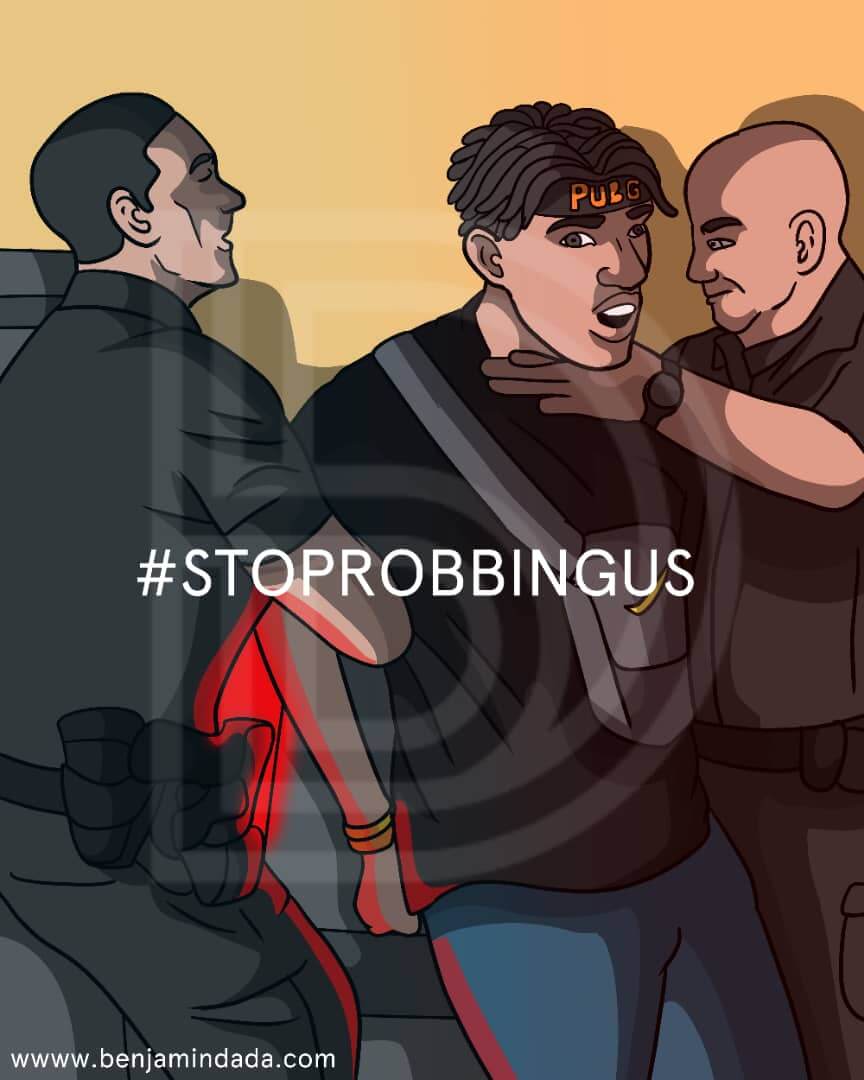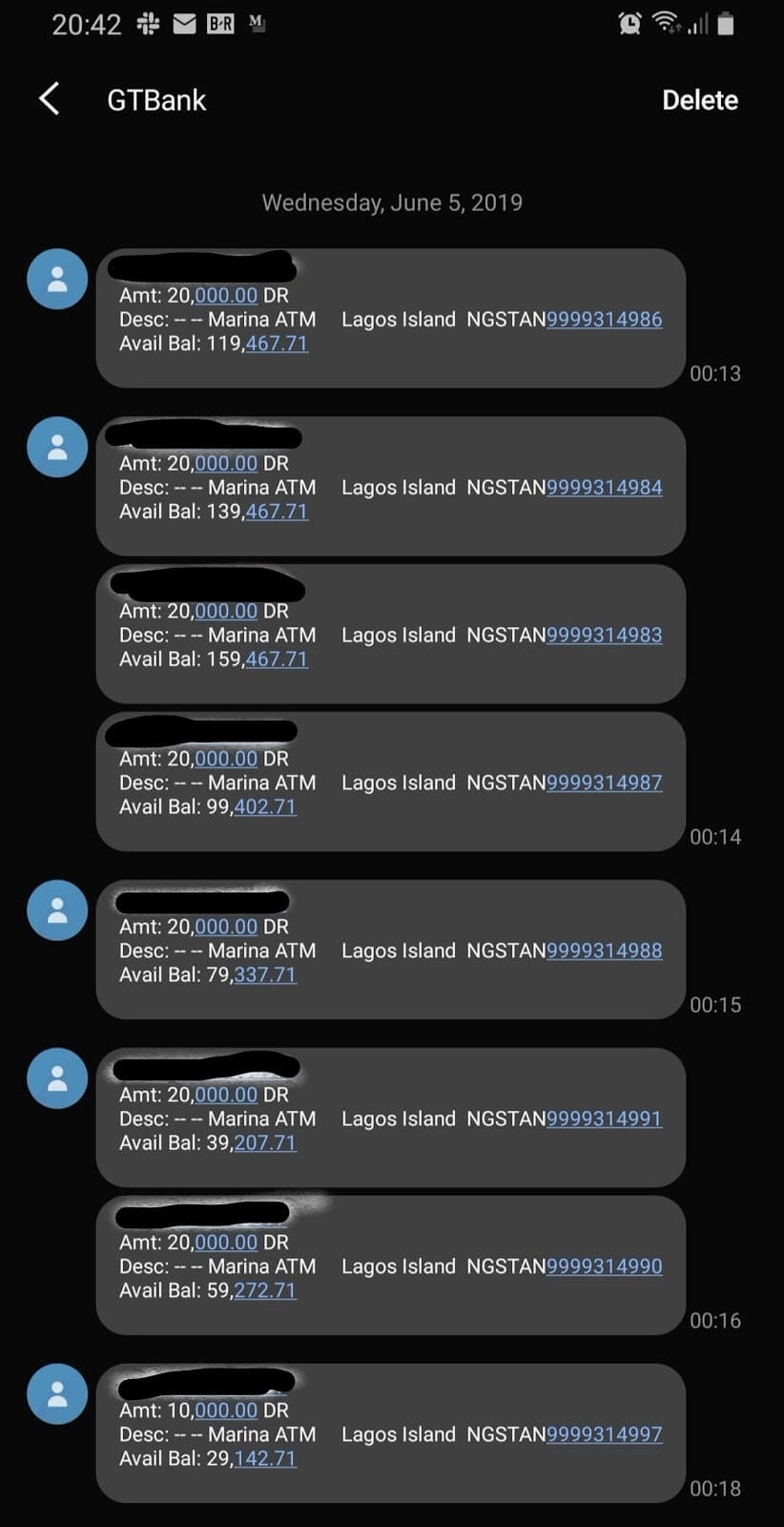#StopRobbingUs—Ketu, Ogudu, others identified as SARS hotspots in Lagos
A timeline of SARS brutality, as the Nigerian tech community launch #StopRobbingUs campaign.

The Special Anti-Robbery Squad (SARS) of the Nigeria Police Force (NPF) have continuously harassed young Nigerians
Any young person with a laptop, good smartphone (especially iPhone) or is well-dressed is susceptible to being stopped by the unscrupulous elements in the NPF, and unlawfully arrested (kidnapped, if you will), assaulted and extorted. Although NPF officials are renowned for doing stop and search, reports of such incidents have escalated with the notoriety of SARS.
Akinmolayan Oluwatoni (AKA Toni Astro), a software developer at Buffer Media Limited—a mobile solutions and value-added service provider, recounted his ordeal with the dreaded unit on September 27 on Twitter. Most victims of SARS (and police) brutality have shared their experiences on the platform, but Toni Astro's thread on Saturday was the tipping point for the closely-knit tech ecosystem.
I grabbed a bike via one of the bike hailing service in Nigeria from Abiola gardens to Ketu. So I could get a BRT from there home.
— Toni Astro (@toniastro_) September 28, 2019
The stakeholders in the tech ecosystem have had enough. And they have launched the #StopRobbingUS campaign, because that is what this is—emblazoned armed robbery. Before now, there's been a campaign to #EndSARS, which have been met with mixed reactions. But this "new" campaign seems to be welcomed by all.
Seven days after Toni Astro was harassed, he revealed that officers involved in the incidents have been remanded and he's been assured of full recovery of his money.
Thanks to everyone,@segalink and the team behind #stopRobbingUs 🙏!
— Toni Astro (@toniastro_) October 4, 2019
I've been assured by the police of the full recovery of my money, which I could have received today if not for my busy schedule. The officers involved have also been remanded @PoliceNG_CRU https://t.co/ksAsS39BnA
Plans are underway to engage the Federal Government and NPF to an ultimate solution to this SARS plague.
In the meantime, I curated a timeline of SARS brutality.
How did it all start?
It all started in Lagos (and will most likely end in Lagos).
SARS is the creation of the former Commissioner of Police of Borno state, Simeon Danlandi Midenda (rtd). He was the one that added 'special' to the name, anti-robbery squad—one of the 14 units in the Criminal Investigation Department (CID) of the NPF—in 1992.
As a Superintendent of Police in Lagos, he was asked to set up an anti-robbery squad in addition to the three existing squads in the state. Mr Simeon told Vanguard, during an interview in December 2017: "I needed a name that was unique, with which my own team will be called and communicated with.... At the end, I simply added 'special' to the existing anti-robbery squad".
Before then, "Special Anti-robbery Squad as a name or the abbreviation SARS never appeared in any kind of police communications", Mr Simeon said.
Until Mr Simeon was transferred to Umuahia, Abia State, in 2002, SARS did not exist anywhere outside of Lagos. Now, they are ubiquitous across the 36 states of the federation, under the guise of combating high rate of crimes.
'Too many cooks spoil the broth'
The proliferation of SARS across the country, without proper management, have diluted their special status and enabled bad eggs among them to continue to cause havoc. Because, indeed, they have achieved some great feats like apprehending notorious criminals across the country.
SARS was supposed to be Nigeria's SWAT (special weapon and tactics) team, which will tackle peculiar cases of criminality. But the contrary is the case—they've become a plague people, especially the youths, avoid.
A report published by the Human Rights Watch in 2005 states how several people detained by the Kano State police command, were beaten by two sergeants, one corporal and other SARS policemen. A former police officer, who resigned in 2003, told HRW: "There are many cases at the [Kano] State Criminal Investigation Department, where the police intentionally shoot people. They are shooting roughly one person per week".
Similarly, Amnesty International published a report on the torture and other ill-treatments in SARS in 2016. According to Amnesty International, several complaints and petitions about torture and other ill-treatment of people by SARS have been received from Anambra, Enugu, Abuja, Port Harcourt, Lagos, Abeokuta, Kaduna, Abakaliki and Umuahia.
According to a survey carried out by Ikechukwu Uzoma, the number of reported incidents of SARS brutality increased significantly from 2014 and peaked in 2017. This culminated in the launch of the #EndSARS, accompanied by the #ReformPoliceNG campaign on January 1, 2018.
Citizens, global hearing of the SARS victims will kick off from the 1st Of January 2018 in Lagos. The world wants to hear your SARS Stories. We are starting with the BBC crew who will be on ground soonest. DM if you want to participate. #EndSARS #ReformPoliceNG pic.twitter.com/t7phELHjZr
— SEGA L'éveilleur®🚨 (@segalink) December 29, 2017
#StopRobbingUs—Where are we today?
#EndSARS campaign, led by Segun Awosanya, led to the re-organisation of SARS in December 2017 and a perfunctory reform of SARS in August 2018, which coalesced all SARS units nationwide under the Federal Special Anti-Robbery Squad (FSARS).

In January 2019, however, the current Inspector General of Police, Mohammed Adamu, ordered the decentralization of FSARS, putting the control of the unit under the commissioner of police of each state.
This rearrangement is just going to fuel corruption and lure the Commissioners of police into deploying SARS as political party Thugs. The stop gap worked because the Commissioners don’t control SARS.
— SEGA L'éveilleur®🚨 (@segalink) January 21, 2019
Basically, the little success of the #ENDSARS and #ReformPoliceNG campaign was short lived.
Some victims of SARS harassment and extortion also shared their experiences with benjamindada.com, which shows the inhumane and illicit activities of SARS never abated.
"I've actually had four experiences with these SARS people", Jesse* recalled. His first encounter was three years ago at Kilo bus-stop, Surulere.
> They are always at Kilo bus-stop. They prowl around Aguda and constitute nuisance a lot of times. Recently, I've seen them carry guns that look like what should be used at war front, *Joel said*Jesse recounted his most recent ordeal with the dreaded unit, which happened on November 16, 2018. Joel said: "I was going for the Night of Worship. I board a bike from my street heading towards Masha. The SARS people were coming from the the other side of Nnobi Street (that connects Agbonyin Avenue). As the bike I boarded got to Kilo Street, they blocked it and told me to come down."
> I was scared. I was afraid. I saw guns and I froze. I didn’t even say a word, I just entered their bus.Jesse said he was asked a lot of questions. "They checked my bag, collected my phone and checked my mail, WhatsApp, Telegram and text messages. At this point, I was just praying that they don't kill me and collect the N50,000 someone sent to me buy books and get other resources I need for the career path I have chosen."
Jesse is a photographer, researcher and tour guide. He started documenting Nigeria's historical structures at age 17.
Jesse continued: "When they asked about the GTBank credit alert, I told them I was on my way to the market to buy books. The officer sitting in the front passenger seat will intermittently say, 'check am well o, no listen to am'. When we got to Masha, they stopped and collected money from the union guys.
"I'm not sure, but that's what they do at Kilo most of the time. When we finally got to Shitta, they collected money from set of people too, then they dropped me and asked me to give them fuel money. I was grateful to God that they didn't take the money.
While Jesse was "lucky" that they didn't collect his money, other people like Tony are not. But having experienced this intimidation four times, Jesse, like most young Nigerians, now become anxious at the sight of a SARS official or their bus.
Jesse said: "Whenever I see those small buses or see them at bus-stops or anywhere, I turn around, walk a bit faster, or just avoid them. I avoid going out now"
When I used to work near Berger, I would extend my walk to the bus stop by over 10 minutes just to avoid the policemen. Anything possible at all just to avoid it. I've entered a shop before to buy things I don't even need because all of a sudden SARS came to the ATM nearby
— Olabinjo (@binjoadeniran) September 29, 2019
Tony told benjamindada.com that he was harassed and extorted of ₦150,000 by SARS officials around Ikeja.

What's Next?
From the stories shared with us (some of which are not published) and investigation, I have cause to believe that the hotspots of SARS in Lagos are Ikeja, Ketu, Magodo, Ogudu and Ikorodu.
I might be traveling this weekend and I’m not playing to take my laptop with me.
— Bukayo Ewuoso (@Bukayor_BK) September 29, 2019
I can’t start explaining what doesn’t exist.
I also avoid places like Ketu, and Ikorodu because of high SARS activities
The #StopRobbingUs campaign conveners aim to ensure young Nigerians, particularly those in the tech ecosystem, are no longer intimidated and extorted by SARS.
Ogudu Area H SARS first asking price is always N1m. Had an encounter with them 2 yrs ago, I price reach N70k after they threatened to waste me. Dem come still collect my number so they can help me get away whenever their colleagues wants to extort me. Ọlọ́pà ya weyrey gan o 😂
— Series Abíọ́dún ੈ (@Engr_Series) September 29, 2019
To avoid a recurrence of what happened to the #EndSARS campaign, the conveners of the #StopRobbingUs campaign must ensure any resolution arrived at cannot be changed by just an executive pronouncement. Perhaps, a court injunction or a constitutional framework that prohibits SARS brutality.







Comments ()